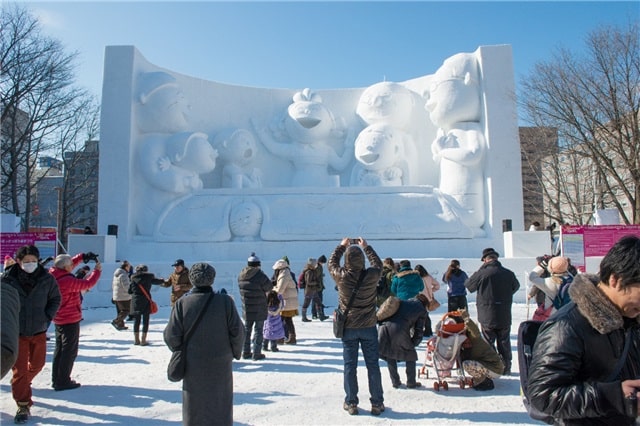There’s no avoiding the fact that Japan gets cold in winter. But that cold weather brings magical scenes that are breathtakingly beautiful. From ice-packed seas in the far north to snow festivals, skiing and more, it’s worth braving the cold temperatures for sights that will dazzle, in spite of the temperatures.
Ice Ice Baby – Drift Ice in Hokkaido
The Okhotsk Sea off the northern coast of Hokkaido is covered in drift ice in winter. To fully appreciate its magic, board an ice-breaking ship for a cruise like no other.
The ice that covers the surface of the water here drifts down from the Amur River in Russia, reaching Hokkaido’s coastal waters by late January and retreating again in late March. It’s at its thickest and most dramatic around the town of Abashiri, and you can easily find an ice-breaking cruiser that will take you out to explore this natural phenomenon. The MS Aurora is a popular and comfortable option.
You can, of course, enjoy the view from the warm interior of the ship, but for real adventure, wrap up warm and head out onto the deck where you’ll be able to see the ship carving a path through the drift ice, and hear the extraordinary sound of the ice giving way. Keep an eye out for seals resting on the ice, and for sea eagles plucking fish out of the frigid waters. On a clear day, the views are magical, the white of the drift ice corresponding with the snowy peaks of the mountains inland, and the clear blue winter sky providing the perfect canvas for it all.
A magical ice kingdom at the Sapporo Snow Festival in February
After a three-year absence, the Sapporo Snow Festival is finally back. Launched in 1950 by a group of high school students who made snow sculptures in the park, it’s grown to be one of the longest-running and most popular winter festivals in the country, with more than 400 spectacular snow and ice sculptures, nighttime illuminations, live music, and the Sapporo Big Air ski and snowboard jump contest.
2023 will be the 73rd time the festival has taken place, and it will run for one week from February 4 to 11. Even if you arrive before the official start of the festival you’ll be able to see the work in progress – soldiers from Japan’s Self Defense Force start creating the structures of the largest ones a few weeks in advance, and watching the process is fascinating. Don’t come expecting overgrown snowmen – the scale and detail of the sculptures is incredible. Previous creations have included large-format models of castles and Thai palaces, as well as manga characters, animals and mythical creatures.
The best place to start your walk through the festival is in the central Odori Park which hosts many of the larger sculptures, as well as plenty of smaller ones. In the western side of the park is the main snow sculpture competition, with teams from around the world competing. There are also illuminations and projections throughout the city, and plenty of cosy places to retreat to for a hot bowl of noodles or a warm drink.
Pro Tip – be sure to wear non-slip boots as the snowy pavements can be slippery. Alternatively, you can pick up spikes to attach to your shoes at many of the city’s convenience stores.
High-end hot springs and a winter festival in Jozankei
On a smaller scale, but no less dramatic, is the candle festival at Hokkaido’s Jozankei Shrine. Known as the Jozankei Onsen Yukitouro, or snow candle way, there’s a special magic to this quiet, peaceful festival where 1,000 candles in lanterns made from ice light up the snow-covered grounds that surround the shrine. This winter’s festival runs from January 28 to February 4, and you can join the visitors to make a negai-no-akari – a wish as you carry your candle to the central snow tower without it going out.
The whole town of Jozankei takes on a magical mood in winter. Famous for its onsen hot springs, the first hot spring bath opened more than 150 years ago. Set in a tree-covered ravine, the scenery is exceptionally beautiful in winter when covered with snow, and there are few things more special than soaking in an outdoor rotenburo bath, watching the steam rise off the surface of the waters while snowflakes fall on you. You can experience this at many of the high-end traditional ryokan inns located throughout the town.
One particularly good option is Nukumori no Yado Furukawa, offering a warm welcome in a cosy traditional setting, with beautiful hot spring baths to soak in. Sink into the private cypress wood bath, or book one of the guestrooms with its own private hot spring bath so you can move straight from bath to bed for a night of deep sleep.
A brand new ski resort – Club Med Kiroro Peak, opening December 15
Hokkaido’s mountains are legendary for the quality of their powder snow, and skiers flock here every winter to enjoy some of the world’s best conditions. A new family-friendly property is opening up for the 2023 winter season, giving visitors even more ways to explore the snowy peaks.
Whether you’re an expert or a novice, the new Club Med Kiroro Peak offers two distinctive resorts to suit all types of families. Club Med Kiroro Peak caters for families with teenagers above the age of 12, and Club Med Kiroro Grand welcomes families of all ages, with a wide range of children’s facilities.
Club Med’s all-inclusive concept means that group skiing and snowboarding lessons are included, providing families with great opportunities to learn together, to practice their skills, or take on the adventurous challenge of the powder-covered mountains.
Adults and older kids will also love heading out on a snow-shoe trek, or finding balance with complimentary yoga classes. There’s also the opportunity to learn about the culture of the Ainu, the first settlers of Hokkaido, through their crafts, carving and music.
After an active day, soak in the resort’s hot spring waters or head to the sauna and whirlpool. And with skiing meaning you’re likely to work up an appetite, you’ll be able to dive right into the extensive dining options across the hotels, with Western and Asian buffets at main restaurant Otaru, specialty Asian dishes including local seafood, meat and vegetables at Ogon, and hearty barbecue items at The Kaen Yakiniku restaurant. It’s all guaranteed to give you enough energy for another exciting day on the mountain.

